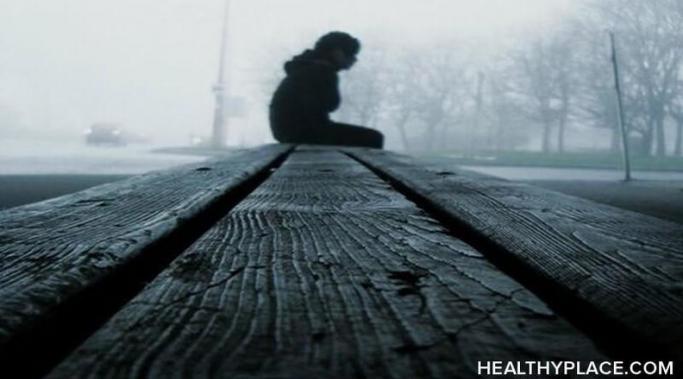One of the problems with mental illness is that it is episodic. Particularly in the beginnings of mental illness, someone will have an episode of illness, and then an episode of wellness. While I'm never against episodes of wellness, this does lead to a problem: when we're well, we convince ourselves we don't have a problem and refuse to get help.
This is normal human behavior. No one wants to believe there is anything wrong with them. So it's natural to deny problems when they are not readily harming us. Unfortunately, this means that many people don't get help for a mental illness.
When we're sick, we're too sick to get help. When we're well, we deny we need it.
Denial
Most people I know with a mental illness try very hard to get better. They look for sources of help, support and information. Most people I know don't sit around waiting for someone to save them.
But then there are the people who do.
There are the people who whine and complain that no one will help them and yet turn down help or refuse to look for it. There are the people who kvetch that there is no support available to them in spite of the fact that the world is drowning in helplines available 24-hours-a-day.
In short, people think mental health services should be brought to them on a silver platter - and then be spoon-fed.
Many people commented on the article I wrote about what a loved one can say to someone who has attempted suicide. One thing is clear from all the outreach - many people have attempted suicide and many people have survived. No one in this situation is alone.
But after a suicide attempt people invariably feel alone. They feel like a freak. They feel hurt and afraid. And when other people deny their suicide attempt, deny their pain, deny their mental illness, this makes things worse, not better.
Denial is keeping your loved one from getting better.
I recently wrote about the myth that you can be "too smart" to have bipolar disorder. I wrote about the prejudicial and false thought that if we were "smart enough" we wouldn't have bipolar. This, of course, isn't remotely true.
A couple of people requested more about bipolar disorder and intelligence.
But I'm sorry to say, the truth is, people with bipolar disorder are actually cognitively impaired compared to the average individual.
I've been wrong about a lot of things in my lifetime. Life is funny like that, always moving the ball when you're not looking.
And one of them was this: I thought I was too smart to have a mental illness.
At some point in the past 40 years some (undoubtedly) new-age guru decided saying nice things to yourself in the mirror was the key to happiness.
"Yay me. I'm so great. Look at me go."
Really? Seriously? You need to look in the mirror and say that to yourself? And you're buying it? Are you four?
In response to some of the comments I see here and elsewhere, here is my response to another ten myths about bipolar disorder.
I take a lot of flak for what I have to say about mental illness. My positions are often blunt and sometimes unpopular. This is fine with me. I’m an opinionated girl. Not everyone enjoys that particular charm.
But one thing that gets said every once in a while is I’m, “playing the victim.” And not only that, but I’m encouraging others to be victims. Contagious victim-ness I suppose.
This, of course, is just a slur designed to make me and others feel bad about what we have to say. Well, I say this:
Admitting to having a mental illness doesn’t mean you’re “playing the victim.” Talking about mental illness isn’t “playing the victim” either.
It's tempting to think that because we read a list of symptoms for a mental illness, we can diagnose ourselves. We might think that taking a self-test online indicates the presence of an illness, or lack thereof. These things, however, are simply not the case.
I was recently having lunch with a woman who has a series of medical issues, including pain management. One of the medications she is on is oxycodone. She said she would like to get off of the oxycodone but when she has tried, the pain has been unbearable and no other pain medication would touch her pain. So I asked her, "if this medication is working for you and other medications don’t work, then why are you trying to get off of it?"
She said it was because of the stigma attached to that medication.
So I told her something important – you can’t let stigma make your treatment decisions.


